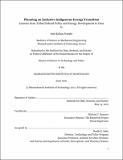Planning an Inclusive Indigenous Energy Transition: Lessons from Tribal Federal Policy and Energy Development to Date
Author(s)
Nabahe, Sade Kailani
DownloadThesis PDF (1.660Mb)
Advisor
Kearney, Michael J.
Terms of use
Metadata
Show full item recordAbstract
In 2019, Governor Michelle Lujan Grisham announced the New Mexico’s dedication to combating climate change and passed the Energy Transition Act (ETA). The ETA calls for 50% of New Mexico’s electricity to be generated from renewable energy resources by 2030, 80% by 2040, and 100% carbon free by 2045 - dramatically affecting how New Mexico gets its energy. These effects will impact some regions and populations more than others. And these issues are not unique to New Mexico.
Indigenous people will be particularly affected due to a long-term reliance on fossil fuels. Since 2003, fossil fuels have provided tribes with over $11.4 billion in royalties, which are used to maintain public infrastructure, run schools, and provide community services. For some tribes, royalties support most tribal operations. For instance, coal royalties supplied 50 percent of the Crow Indian reservation’s funds and oil royalties provided 90 percent of the Three Affiliated Tribes’ revenue. To mitigate impacts, tribes can tap into renewable energy resources on their land. However, current federal policies, processes, and services prevent tribes from doing so.
The goal of this body of work is to inform federal and state leaders how current policies will negatively impact indigenous peoples and perpetuate energy injustice. The paper also looks at how these issues play out in real time in New Mexico, a state that has tremendous renewable energy potential and a large indigenous presence, but will grapple with a long history with coal, oil, and natural gas. Lessons learned are drawn from tribal federal policies and tribal energy development experience. In the end, the paper develops policy recommendations, in the hopes of creating a more inclusive, equitable indigenous energy future.
Date issued
2021-06Department
Massachusetts Institute of Technology. Institute for Data, Systems, and SocietyPublisher
Massachusetts Institute of Technology